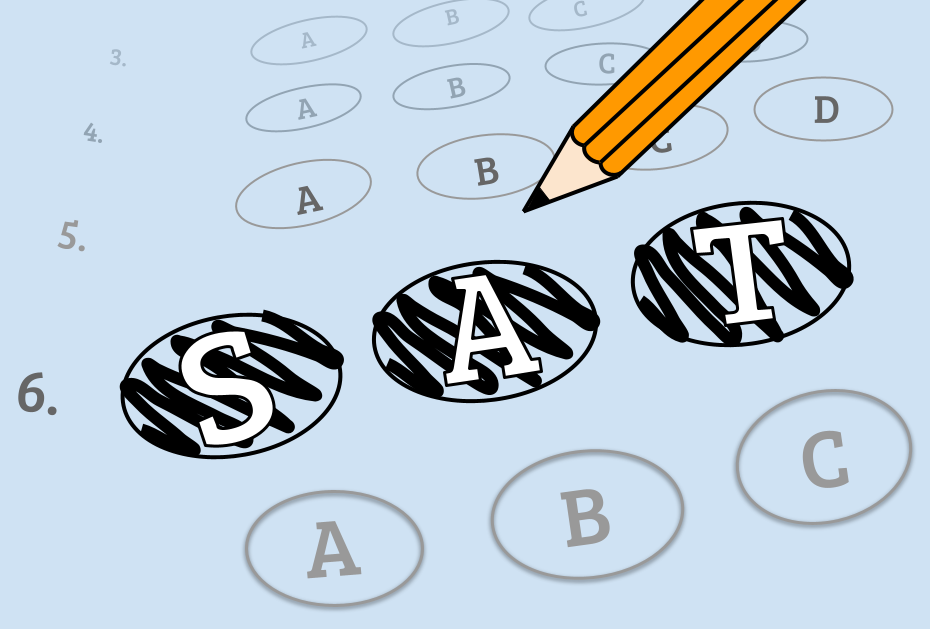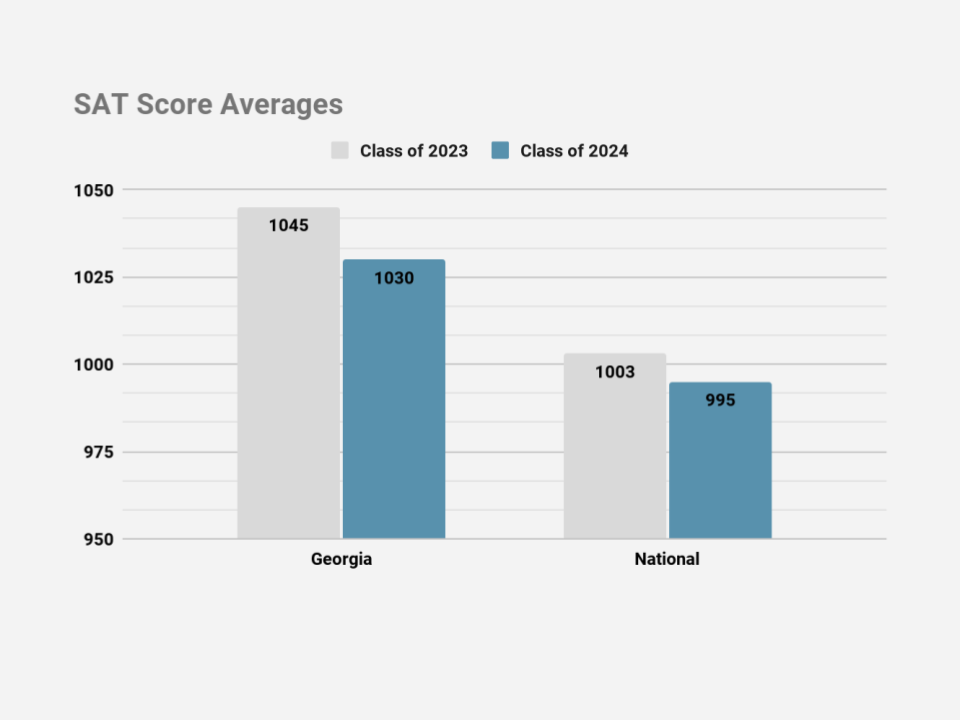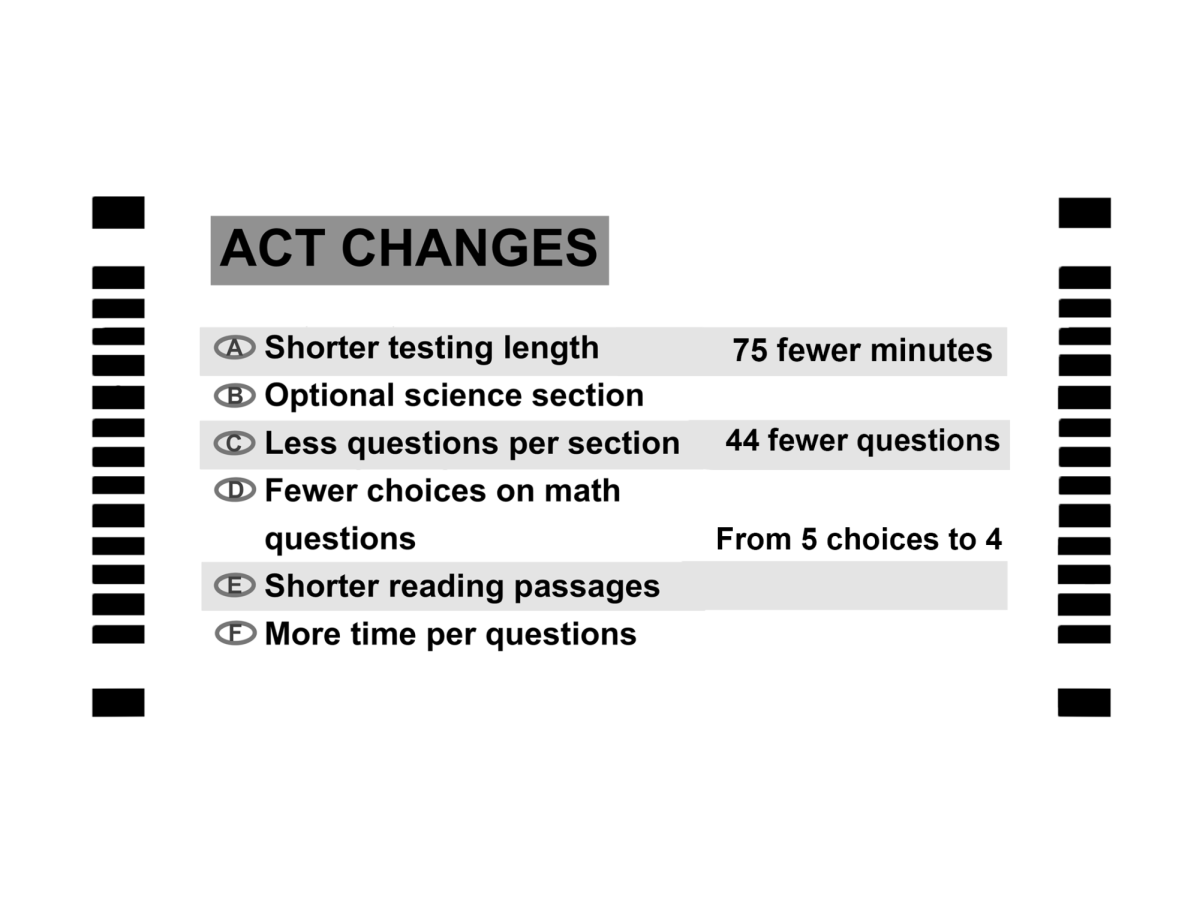The average SAT score for public high school students in Georgia dropped from 1045 with the class of 2023 to 1030 with the class of 2024.
Despite this 15-point decrease, the Georgia class of 2024 represents the seventh graduating class in a row to beat the public school national average on the SAT. This year, Georgia was 35 points above the 995 national average.
“This is a great achievement for all students in Georgia public schools,” project leader Phoebe Chung said. “There are many possible reasons [for the Georgia average being higher] and it’s hard to pinpoint exactly why. Possible contributing factors could range from students’ overall math and reading skills improving, to their testing skills improving or even to a change in the population demographics.”
The national average also decreased from 1003 to 995. This eight-point drop may be less than the 15-point drop among Georgia students, but it is still a cause for concern. Midtown college advisor Rohini Bose said there could be many reasons the SAT scores dropped on both the national and state levels.
“One [reason the SAT scores dropped] may be that the decrease is part of the natural fluctuations of yearly average test scores,” Bose said. “Or perhaps the economic climate has led to families choosing to not invest as many resources into test prep. Maybe the test-optional policies implemented during the pandemic made it so that students saw less of a benefit to focusing their resources on test prep. It’s hard to say without actually delving in and conducting a study.”
The average SAT score at Midtown for the class of 2024 was 1166. This is 136 points above the Georgia average and 171 points above the national average.
“Midtown students are generally speaking very self-motivated which is key to success,” Chung said. “Weekly teacher tutorials, while not explicitly targeting test prep skills, addresses reading, math and critical thinking skills, all of which are essential for improving standardized testing scores for students. Counselors have also promoted free SAT prep resources such as Khan Academy, and our College Advisors are also on hand to provide any additional resources students may need.”
College Advisor Adam Jolliff also said the recent trend in colleges going test-optional could have had an impact on test scores.
“The biggest trend I’ve noticed in regard to test scores at colleges is mainly that many colleges are switching to test-optional admissions,” Jolliff said. “In terms of schools that still require test scores, the average test scores seem to be increasing. In the last few years there have been less people applying to four-year colleges, but the average student is applying to a much higher number of schools, which is making the top schools even more competitive in terms of test scores. It seems the colleges that would be admitting more students with lower test scores for the most part have just stopped requiring them.”
Senior Ava Johnson believes that the math section is harder than the reading section, which aligns with the results from both the Georgia and national averages. Both the Georgia and national averages showed a higher score on the Evidence-Based Reading and Writing, 527 and 507, respectively, and the math section, 503 and 488, respectively.
“I have always struggled more in math sections on standardized tests, including the SAT,” Johnson said. “I think the math sections are just harder. Also, we learned the math tested on the exam freshman and sophomore year, so it isn’t fresh in my brain.”
The Class of 2024 was the last graduating class to take the paper version of the SAT. In March 2024, the SAT changed to a digital adaptive version. This shortened the test from three hours to two hours, allowed students to use a calculator in every math section and made the reading short passages instead of a few long texts.
This change could cause significant disparities in both the national and Georgia averages for the class of 2025 and past. Bose said she could see the scores fluctuating in either direction.
“It’s extremely hard to speak to [how the transformation to a digital SAT will impact scores] on a national or state level,” Bose said. “I could see test scores decreasing because the new format may present new challenges for students, and I could also see test scores increasing because the digital format may reflect more of what students might be getting accustomed to in regards to standardized testing. I think only time will tell.”
Senior Ava Johnson took both the digital and paper SAT. She said the digital SAT had harder questions, but it is easier to get more points.
“Obviously every version of the SAT is hard, but I think that the paper version was longer but more straightforward,” Johnson said. “The digital SAT has some really easy questions and some that are pretty much impossible. I have heard of a lot of really smart people not getting the scores they wanted on the digital SAT, so I could see the averages continuing to fall with the class of 2025. However, I also think it is easier to figure out where you are going wrong in the digital SAT, so you can earn points back easier.”






















